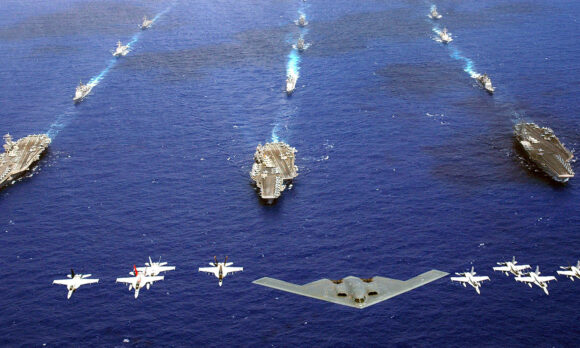Improvements in adversaries’ conventional and nuclear capabilities are shifting the global balance of power and eroding strategic stability. These concurrent improvements combine to create more complex challenges that further stress existing deterrence concepts. The CNAS Defense Program explores options to strengthen deterrence and prevent escalation through the following projects:
Nuclear Deterrence and Escalation Management
The reemergence of great power competition combined with the expansion and modernization of nuclear arsenals worldwide has challenged long-held assumptions of nuclear non-use in crisis and conflict. In particular, Russian nuclear signaling, North Korean nuclear and missile activities, and expanding Chinese nuclear capability and capacity, combine to dramatically alter the international nuclear deterrence landscape. This line of effort considers what is needed to enhance U.S. deterrence against multiple nuclear-armed adversaries and manage escalation with adversaries in potential conflict.
Rebuilding the Arsenal of Democracy
The U.S. defense industrial base (DIB) has struggled to fulfill ally and partner security requirements while simultaneously meeting the demands of great power competition with the People’s Republic of China. This research area identifies the changes needed to create a DIB that is prepared, responsive, resilient, and capable of supporting the requirements of great power competition.
Improving Posture
The U.S. military posture—its forces, bases, and activities—not only enables rapid responses to crises but is also critical for extended deterrence. Yet a smaller American force struggles to meet the global demands for presence, while adversaries’ growing long-range precision strike capabilities hold U.S. bases and forces at risk. This line of effort seeks to develop new concepts and strategies to better manage limited resources, enhance force survivability, and strengthen power projection.
Enhancing Cooperation with Allies and Partners
U.S. allies and partners are as critical as ever to preserving deterrence in the face of opportunistic aggression by potential adversaries in the Indo-Pacific, Europe, and beyond. However, significant political, legal, and technical barriers continue to impede greater strategic and operational integration among these nations. This research area identifies how the United States can integrate allies and partners into strategic and operational planning to strengthen deterrence in priority regions.
Research Team:
-
Stacie Pettyjohn
Senior Fellow and Director, Defense Program
-
Becca Wasser
Senior Fellow and Deputy Director, Defense Program
-
Carlton Haelig
Fellow, Defense Program
-
Philip Sheers
Research Assistant, Defense Program
-
Molly Campbell
Research Assistant, Defense Program
-
Jack Keating
Intern, Defense Program
Highlights
-
Over the Brink
A new era of nuclear deterrence is taking shape in the Indo-Pacific theater. As the People’s Republic of China (PRC) dramatically expands and modernizes its nuclear arsenal, t...
By Andrew Metrick, Philip Sheers & Stacie Pettyjohn
-
From Production Lines to Front Lines
Executive Summary The U.S. defense industrial base (DIB) is struggling to meet the demands of the current strategic environment—let alone prepare for a potential conflict agai...
By Becca Wasser & Philip Sheers
-
More than the Sum of its Parts: Developing a Coordinated U.S.-Australian Response to Potential Chinese Aggression
If China engaged in a war of aggression, the United States, Australia, and other nations would not have much time to develop a coordinated response....
By Stacie Pettyjohn




















